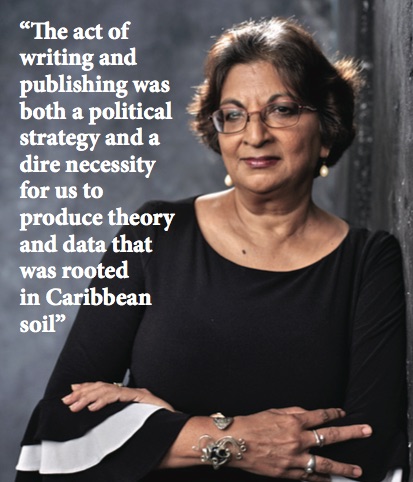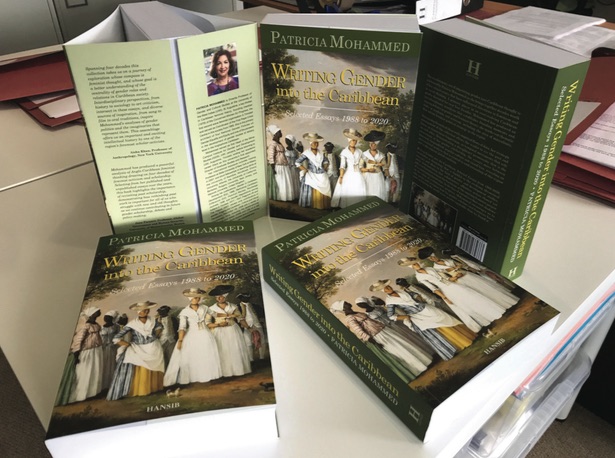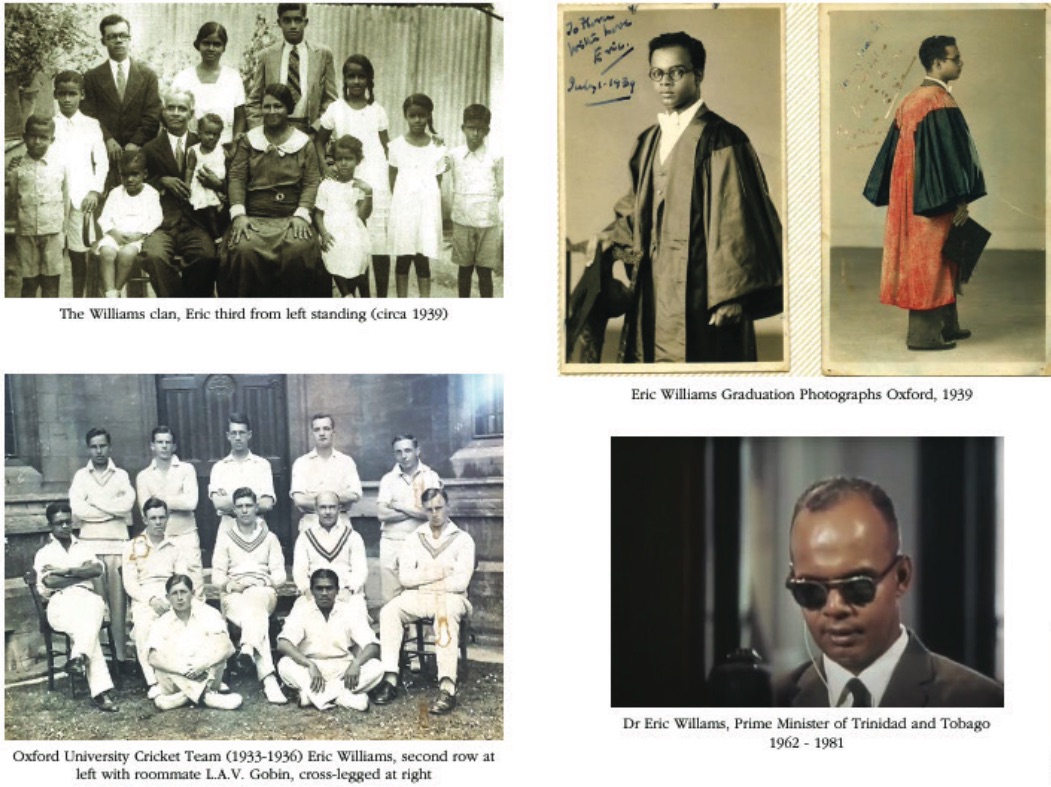
“I have always been an avid reader, attracted to the power of the word,” says Professor Patricia Mohammed. “I have never felt comfortable in front of a microphone or a large group. From childhood, the written word has spoken to me across centuries and societies.”
Mohammed, Emerita Professor of Gender and Cultural Studies at UWI St Augustine and a celebrated Caribbean feminist, has had an academic career heavily influenced by her love of reading, writing, history, and the visual arts. Her latest book, Writing Gender into the Caribbean: Selected Essays 1988 to 2020, spans three decades of research and ideas. Writing Gender, published by Hansib Publications, is a collection of 21 essays selected from Professor Mohammed’s writing and publishing. Most, she says, “were to be found in disparate journals or as chapters in books”.
The book is very much a personal reflection on her work:
“In 2019, I retired as Professor of Gender and Cultural Studies from The University of the West Indies, St Augustine. One of the first things one does after retirement is to evaluate what you have spent a lifetime doing – at least I did. The primary reason for bringing together this body of essays was to follow the trails of my own thoughts and to map the genealogy of my own writing on gender in the Caribbean.”
The essays selected are distributed over five different sections, each of which address a different theme. Section 1, “Originary Narratives and a Political Grammar for Caribbean Feminism”, progresses from early concerns with Caribbean feminism to a consideration of current questions that the movement and concepts now raise globally. Section 2, “Indo-Caribbean Feminist Intersections”, examines the symbolism of gender identities and performance of gender roles among the Indo-Caribbean descended populations, arguing that these establish different definitions of Caribbean womanhood and manhood.
“Section 3, ‘Inviting Masculinity’,” Professor Mohammed explains, “speaks to the ongoing dialogue with masculinity and men which Caribbean feminism engaged in from the outset of the second wave feminist moment. Two of the essays, ‘Sketches in a Biography of Eric Williams’, on the first Prime Minister of Trinidad and Tobago, and ‘Drafting Gender Equality Frameworks’ a comparative reading of the films The Harder They Come and Brokeback Mountain, straddle disciplinary enquiry in order to allow a contemplation of the mind of the masculine rather than an attempt to prescribe masculinity.”

Section 4 includes essays that reflect on her fairly extensive work on gender policy in the Caribbean, including a chapter that provides a practical guide for those involved in creating gender equity policies or programmes. The final section, ‘Gender and Cultural Storytelling’, draws on music and the visual image, demonstrating, she says, “that our gender identities are inevitably and consistently bargained in and through culture”.
Professor Mohammed has been a feminist activist since 1979 and a professor since 2005. However, Writing Gender is more than a retrospective of her scholarly pursuits. It is also built on the interests that have driven her since childhood.
“I had a passion for history as a subject,” she recalls, “and had also read the novels of the Bronte sisters and Jane Austen for leisure and the earliest fiction writers from the Caribbean. I grew up devouring comic books before television took over from reading. Photography – writing with light – and the power of the visual to convey messages presented eloquent ways to generate ideas and information.”
For the book’s cover she chose an 18th century painting by Agostino Brunias entitled Free Women of Colour with Their Children and Servants in a Landscape.
“The act of ‘writing’ for me has never been restricted to the alphabet. Starting from secondary education and continuing on to an academic career, writing and visual representation began to surface as a preferred method of communication. The academic space of knowledge-making and feminist activism were the prime gateways through which I would negotiate the politics of location, class, gender, ethnicity, and culture to find a voice,” she explains.
Writing and scholarship has been crucial to the rise of gender studies in the region, Prof Mohammed says. When she began writing her masters’ thesis on Women and Education in Trinidad and Tobago for The UWI over four decades ago, the disciplinary area of gender studies did not exist. The last three decades of the 20th century, however, marked a founding moment for gender scholarship in the Caribbean.
“The act of writing and publishing was both a political strategy and a dire necessity for us to produce theory and data that was rooted in Caribbean soil,” she recounts. “My earliest colleagues in this fellowship, among them Jocelyn Massiah, Peggy Antrobus, Eudine Barriteau, Elsa Leo Rhynie, Rhoda Reddock, Barbara Bailey, Bridget Brereton, and many others, all knew that we had to lay claim to our home grown knowledge. We had been weaned on authors like Germaine Greer, Juliet Mitchell, Sheila Rowbotham, Simone De Beauvoir, bell hooks, Audrey Lorde, Toni Morrison – the list is long – who had inspired a generation of second wave feminists.”

Images from the new book focusing on Dr Eric Williams.
She recalls meeting British feminist Sheila Rowbotham while studying for her PhD in 1989 in the Netherlands and telling her that her book Woman’s Consciousness, Man’s World had been inspirational and had encouraged her to process and write about the experience of the Caribbean women’s movement from a first person perspective.
“She was a very approachable woman,” Professor Mohammed says. “She was delighted to find someone younger, from the other side of the world, who could relate to what she had written and said to me, ‘this is why I write, this makes my life and work worthwhile’. I have received such comments myself from many readers and it makes the often arduous act of writing an honourable one.”
Of her latest work, the Caribbean feminist says she wanted to produce an accessible text so that the interested reader throughout the region and the diaspora could easily grasp the etymology of concepts and ideas that shaped the discipline, and thus could continue to expand its scope.
Writing Gender has already received positive attention. In 2021, the Caribbean Studies Association conferred the Barbara T Christian Award to the book, describing it as a “masterpiece which will have lasting impact on Caribbean Studies” and “a pioneering book which centres both intersectionality and Caribbean American feminist/gender/queer analyses with extensive research, literary creativity and sensual intelligence”. “The book,” said the association, “possesses a respectful inclusivity of diversity, equity and advocacy for centring and grounding gender studies, development, affairs and spaces within the 21st century.”
Writing Gender into the Caribbean: Selected Essays 1988 to 2020 is available in Trinidad and Tobago at the UWI Bookshop and the Paper Based Bookshop at Normandie the Hotel, as well as online at https://www.hansibpublications.com/ and as an eBook at Amazon.com.